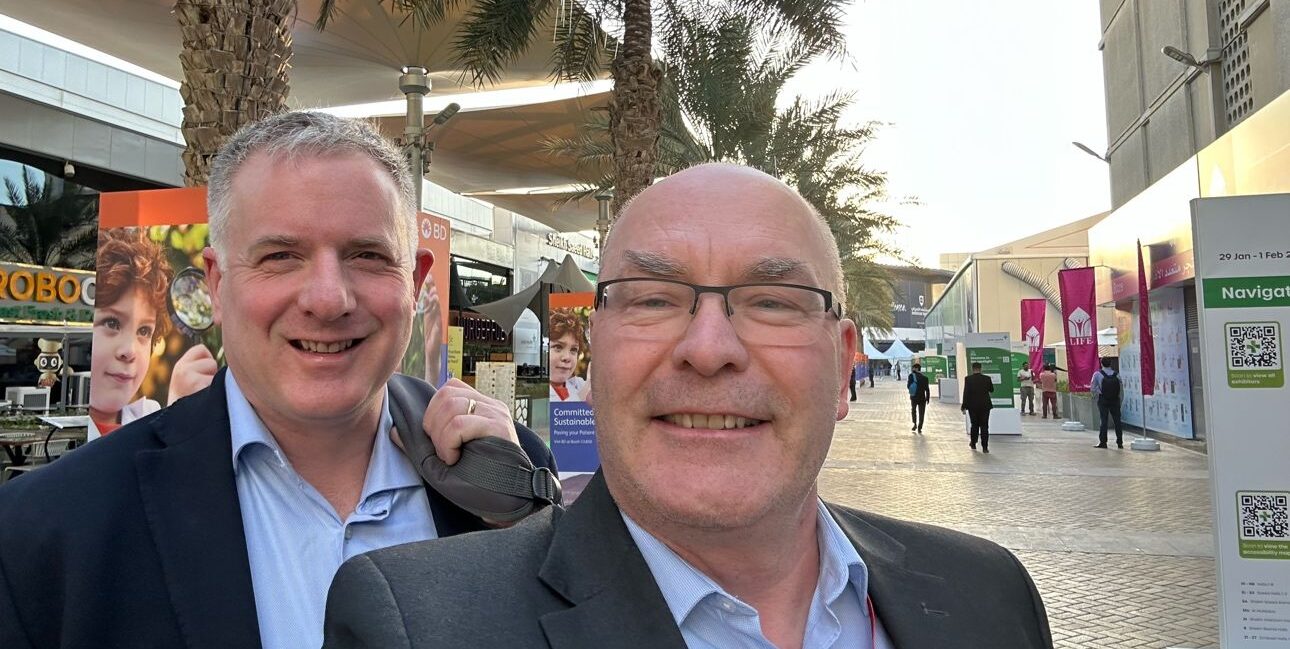Predictive Health Intelligence was recently part of a UK government trade delegation to the Arab Health Conference, which took place in Dubai at the end of January. We asked Managing Director Neil Stevens, who was part of the PHI team, to tell us more about it.

This was a key conference for the medical world, and we were amazed and delighted to be chosen as part of the official UK Department of Business and Trade (DBT) delegation for what is the biggest health show in the Gulf.
The first thing I noticed was the sheer scale. Compared to UK and European conferences, it was huge. There were over 3,500 exhibitors and a massive 30,000 delegates. Although Dr Jobson, our Medical Director, and I have been to several conferences, we were a little wide-eyed as we went around and saw all the amazing health tech on offer. There was a diagnostics hall with not just one but many working full-size CT scanners, x-ray machines, endoscopy equipment and heart monitors. We saw a lot of novel and amazing technologies.
Another hall had a transport zone with multiple hi-tech ambulances, motorcycles, and cars on show.
At the other end of the scale there were a range of stalls offering really small items, specialising for example in plasters, dressings and bandages, or catheters. So, you could spend £500k or 50p and everything in between.
Some of the exhibition halls were organised by country, so we could walk through the China zone, the UAE zone, France, and Wales. Some of the individual zones—Germany springs to mind—were probably bigger than a typical UK conference. So even after four full, busy days, we still hadn’t seen everything.
Many of the individual stands were also two or three times the size of stands at other conferences and displayed an impressive amount of innovative high-tech equipment. It almost felt space-age.
As you’d expect, the whole world was represented, and we were able to meet a lot of fascinating people; doctors, technicians, digital specialists, salespeople. Ironically, having travelled over 3500 miles to get to the conference, I bumped into a few people I know from the UK and haven’t seen for ages!
We had some excellent meetings with a range of people, supported and facilitated by the UK trade team on the UK stand. The International Trade Advisor and her team were extremely useful, helping us understand the different health markets across different regions and to see how we might engage. They were all, as you’d expect, very different in terms of funding and governance and it was key to have the expert advice from the DBT team. We now have a lot of people to follow up.
I was also lucky enough to be invited to a reception at the UK Ambassador’s residence. Sir Professor Stephen Powis, NHSE Medical Director, spoke at the event, as did the Ambassador, Edward Hobart. They stressed the importance of trade, especially between the UK and the Gulf and the hope that innovation in health can be used to help close the gap between supply and demand in healthcare.
As well as being a fascinating conference for us individually, was this useful for PHI? It certainly helped get us on the international stage, and we held several meetings with international contacts. It was significant that everyone we spoke to was impressed with what we were doing and wanted to know more. This was just the start of a dialogue, not the end, but it was hugely positive.
The DBT team have offered to continue to support us and will broker further meetings as required, putting us in touch, for example, with expert regulatory advice, and keeping us informed through the nominated DBT trade advisor who is based in Bristol.
The conference season hasn’t really started yet, but PHI plans to attend the European Association for the Study of Liver Disease in Milan in June, the British Association for the Study of the Liver in Harrogate in October, and the American Association for the Study of Liver Disease in San Diego in November.
